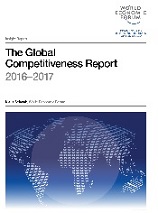World Bank, (2016), “The World Bank Annual Report 2016”, World Bank, September This Annual Report, which covers the period from July 1, 2015, to June 30, 2016, has been prepared by the Executive Directors of both the International Bank for Reconstruction and Development (IBRD) and the International Development Association (IDA) collectively known as the World Bank—in accordance with the respective bylaws of the two institutions. Dr. Jim Yong Kim, President of the World Bank …Read More
The State of Advanced Economies and Related Policy Debates: A Fall 2016 Assessment
Blanchard, Olivier, (2016), “The State of Advanced Economies and Related Policy Debates: A Fall 2016 Assessment”, Peterson Institute for International Economics, September This Policy Brief reassesses macroeconomic policies in the current environment of low growth and low interest rates in major advanced economies. Despite low rates, demand remains anemic. The scope for monetary policy, which has carried much of the burden to stimulate demand, is increasingly limited. But there is plenty …Read More
Assessing the Euro Area’s Shock-Absorption Capacity: Risk sharing, consumption smoothing and fiscal policy
Alcidi, Cinzia, Thirion, Gilles, (2016), “Assessing the Euro Area’s Shock-Absorption Capacity: Risk sharing, consumption smoothing and fiscal policy”, CEPS Special Report No.146, September Based on a combination of quantitative analysis and a qualitative forward-looking approach, this paper assesses both the state of play and the future capacity of the EMU to respond and adapt to asymmetric shocks. The objective is to provide a basis upon which to gauge the potential value …Read More
The Italian Non-Performing Loans Problem And Europe
Minenna, Marcello, (2016), “The Italian Non-Performing Loans Problem And Europe”, Social Europe, 30 September The narrative about Eurozone problems is often – and rightly – focused on the Italian banks’ troubles, burdened as they are by €338 billion of non-performing loans (NPLs) with little or no chance of recovery owing to the persistent crisis of the Italian manufacturing sector. The Monte dei Paschi drama is just the tip of the iceberg: …Read More
Ultra-low or Negative Yields on Euro-Area Long-term Bonds: Causes and Implications for Monetary Policy
Gros, Daniel, (2016), “Ultra-low or Negative Yields on Euro-Area Long-term Bonds: Causes and Implications for Monetary Policy”, CEPS Working Document No. 426, September The importance of monetary policy for the current ultra-low interest rates is often over-estimated. As emphasised by ECB President Draghi himself, monetary policy cannot determine long-term rates directly, and its influence on long-term real rates is even more limited and indirect. Moreover, long-term bond yields have fallen to unprecedented …Read More
The Perils of Debt Complacency
Reinhart, Carmen, (2016), “The Perils of Debt Complacency”, Project Syndicate, 28 September “What a government spends the public pays for. There is no such thing as an uncovered deficit.” So said John Maynard Keynes in A Tract on Monetary Reform. But Robert Skidelsky, the author of a magisterial three-volume biography of Keynes, disagrees. In a recent commentary entitled “The Scarecrow of National Debt,” Skidelsky offered a rather patronizing narrative, in a …Read More
The Global Competitiveness Report 2016–2017
Schwab, K., (2016), “The Global Competitiveness Report 2016–2017”, World Economic Forum, 28 September The Global Competitiveness Report 2016–2017 is being launched at a time of rising income inequality, mounting social and political tensions, and a general feeling of uncertainty about the future. Growth remains persistently low: commodity prices have fallen, as has trade; external imbalances are increasing; and government finances are stressed. However, it also comes during one of the …Read More
Why far right parties do well at times of crisis: the role of labour market institutions
Vlandas, Tim, Halikiopoulou, Daphne, (2016), “Why far right parties do well at times of crisis: the role of labour market institutions”, European Trade Union Institute, July The far right is on the rise in many western and eastern European countries. The 2008 Eurozone crisis is an obvious source of blame for this phenomenon; indeed, a large body of literature suggests that economic malaise prompts support for far right parties. This conventional wisdom, however, is …Read More
What Else Can Central Banks Do?
Ball, Laurence, Gagnon, Joseph, Honohan, Patrick, Krogstrup, Signe, (2016), “What Else Can Central Banks Do?”, ICMB – CEPR, Geneva Reports on the World Economy 18, September The Geneva Reports on the World Economy are published annually by CEPR and ICMB and have been providing innovative analysis on important topical issues facing the global economy since 1999. This 18th report focuses on what central banks can do to stimulate economies when interest rates …Read More
The objectives of financial stability policy
Tucker, Paul, (2016), “The objectives of financial stability policy”, VoxEU, 28 September The objective of financial stability policy is unclear. Is it the resilience of the financial system, avoiding the costs of systemic collapse, or managing the credit cycle, containing the costs of resource misallocation and over-indebtedness? This column argues that the answers have serious implications for what can decently be delegated to independent ‘macroprudential authorities’, but have barely been debated …Read More







